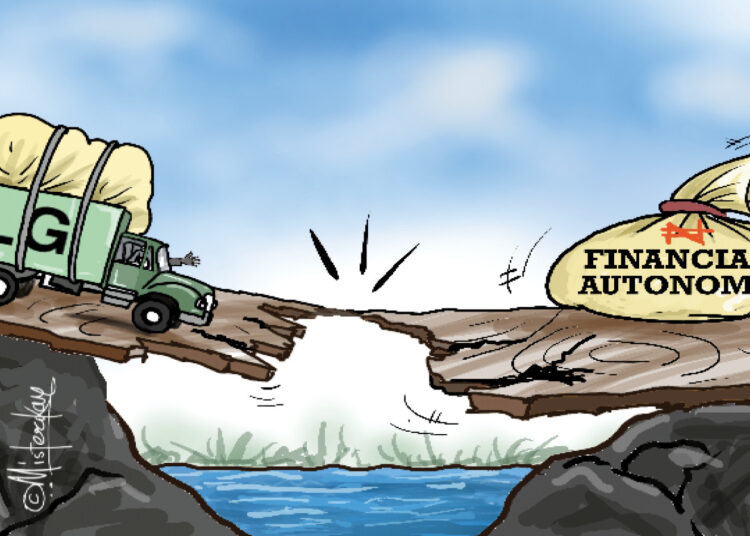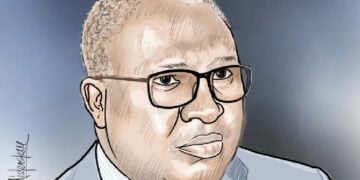Nigerians have long yearned for it. Their faces were lit up with glee when the Supreme Court—our highest judicial authority— ruled in its favour in July last year. Yet, it’s time to face the hard truth once again: in spite of the respite that came with the apex court pronouncement, financial autonomy for local governments in Nigeria is still a mirage. It would be easier for a camel to pass through the eye of a needle than for this dream to unfold into a pleasant reality.
In a nation where the rule of law is upheld, the Supreme Court’s landmark judgement on July 11, 2024, which validated the financial autonomy of local governments, would have been immediately implemented. That judgment should have closed the chapter on this prolonged controversy, finally freeing the third tier of government from the chains that have long bound it.
But Nigeria thrives on contradictions. So, it’s not surprising that nearly a year after the Supreme Court’s decisive pronouncement, we are still entangled in endless calls for autonomy. It is painful, but this is the reality of our lived national experience.
A Bumpy Journey
The bumpy ride toward local government autonomy became obvious the moment the Supreme Court issued its verdict. Almost immediately, Nigerians were told that governors had requested more time to prepare for implementation. Months after the governors reportedly asked for a delay—citing the absence of executive structures in some states and the need to conduct council elections—we remain far from granting financial autonomy to local councils.
It is baffling to believe that those who have systematically crippled local government structures by hijacking their autonomy can now be trusted to ensure its enforcement. But this is Nigeria—where even the absurd becomes plausible.
Ironically, the government that initiated the lawsuit leading to the Supreme Court’s verdict is now presiding over a macabre dance of inaction simply because the administration, with its eyes fixed on the president’s reelection, wants to be politically correct. This selective obedience to court rulings, based on political expediency and re-election strategies, has left the autonomy of local governments hanging in limbo. In this political climate, governance and the welfare of citizens take a back seat to short-term political interests.
Despite the 1999 Constitution (as amended) recognising local governments as the third tier of government, governors have thoroughly emasculated them. The result? A system that is underfunded and understaffed, incapable of initiating meaningful development projects, and, at best, exists merely to pay salaries—often in part, not in full.
It’s no wonder that Nigerians are not surprised. Governors have long weaponised the local government joint account to siphon funds meant for the councils. Now, these same governors are overtly and covertly frustrating the efforts to implement financial autonomy for local governments
A Hollow Structure
Local governments were designed to bring governance closer to the people, but over the years, governors have reduced them to lifeless entities through unchecked influence. Bereft of the financial freedom needed to function meaningfully, local councils are in shackles in most states. Despite receiving monthly allocations from the federation account, most of them cannot execute a single viable project.
How many Nigerians are even aware that local governments are mandated to provide essential services—education, healthcare, infrastructure, law enforcement—and serve as a vital link between the people and the government?
Only a few can claim they do. And that’s because these councils, stripped of financial lifelines, can barely manage wage payments. They are supposed to maintain roads, drainages, public parks, transport systems, and waste disposal. However, with no funds, these responsibilities remain largely abandoned.
The agitation for local government autonomy grew out of the glaring imbalance in our governance structure, leading to the case filed at the apex court by the federal government through the Attorney General of the Federation. But even with that laudable judgment, the situation remains unchanged. Nearly one year later, local governments are yet to receive any direct allocation from the Central Bank of Nigeria (CBN). The ruling, it seems, has become meaningless.
Entrenched Resistance
This week, The Punch reported that some governors have instructed council chairmen not to open accounts with the CBN. Isn’t it surprising that council chairmen are asked not to open these accounts, which are necessary for the seamless and direct disbursement of funds from the federation account?
“Some governors have resorted to intimidation and coercion, pressurising their local government chairmen to refrain from opening the designated account for direct allocation payments.”
This is no longer just resistance; it is sabotage. These governors treat local government funds as their personal estate—spending when, where, and how they please. And why do they keep getting away with it? The answer is simple: we are talking about the most powerful political office in the land—governors in Nigeria are very powerful!
Sadly, the governors get away with emasculating the local government areas because they are powerful and because of the flawed recruitment system at the local level. Council chairmen are usually handpicked by governors or their loyalists, ensuring that only the pliant make it into office. Their tenure is entirely dependent on the whims of the state governor, who can remove them at will.
When this administration first approached the Supreme Court, many Nigerians believed the time had finally come for the long-overdue autonomy. However, the current stalemate, especially the unnecessary hurdles around opening a CBN account and allegations of governors threatening council officials, is a clear indicator that autonomy remains a distant dream.
Ultimately, the dilemma is simple: somehow, the power to implement local government autonomy seems to lie with the governors, not the courts, and the governors are unwilling to surrender that power due to the privileges they would lose.
What we have today is not what the drafters of the Nigerian Constitution envisioned for local governments, and from all indications, no meaningful change is on the horizon. At this rate, perhaps it’s time we asked the hard question: Are we not better off with just two tiers of government?





